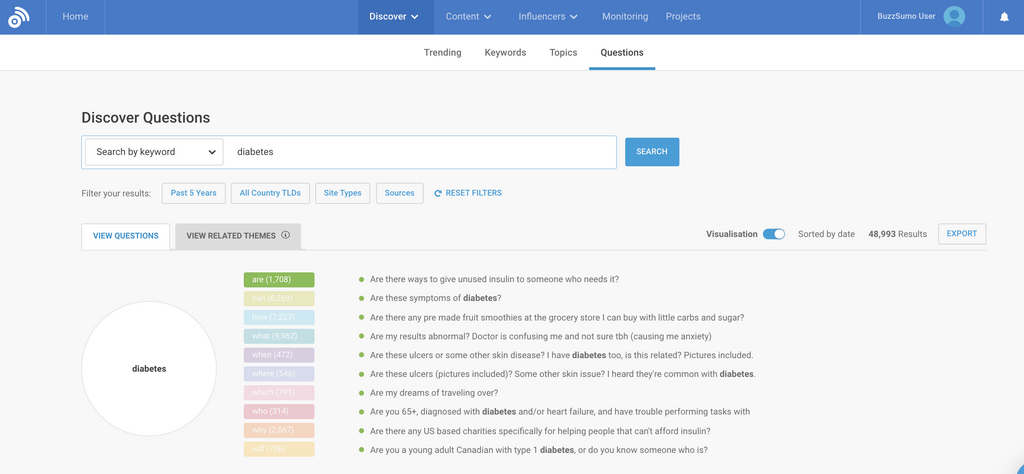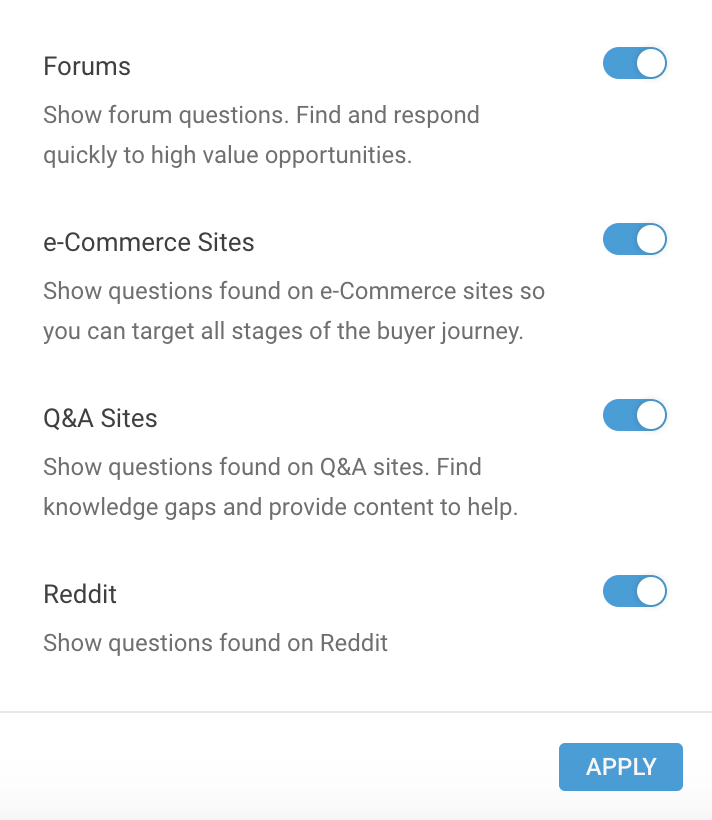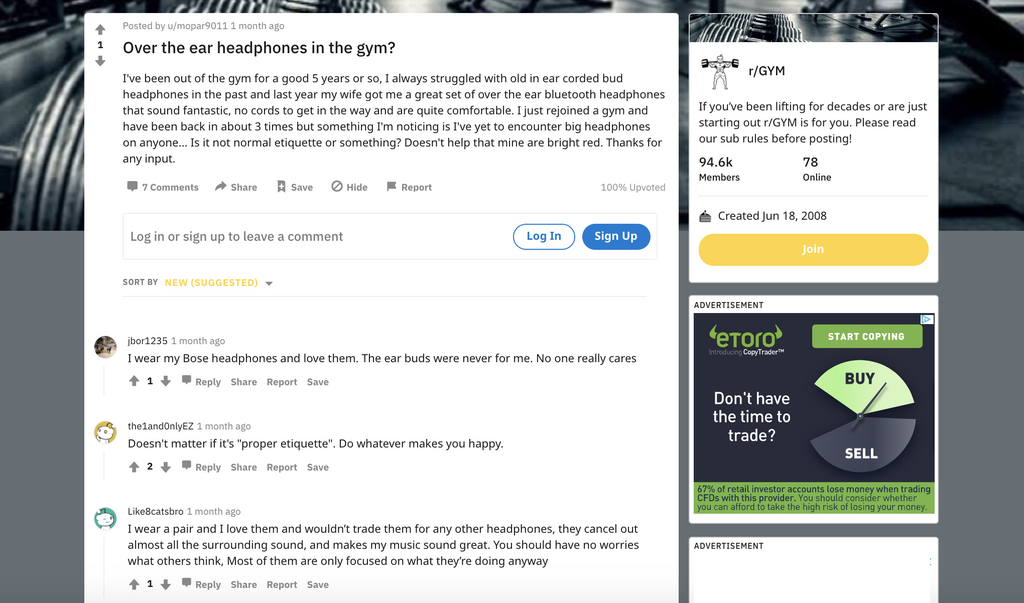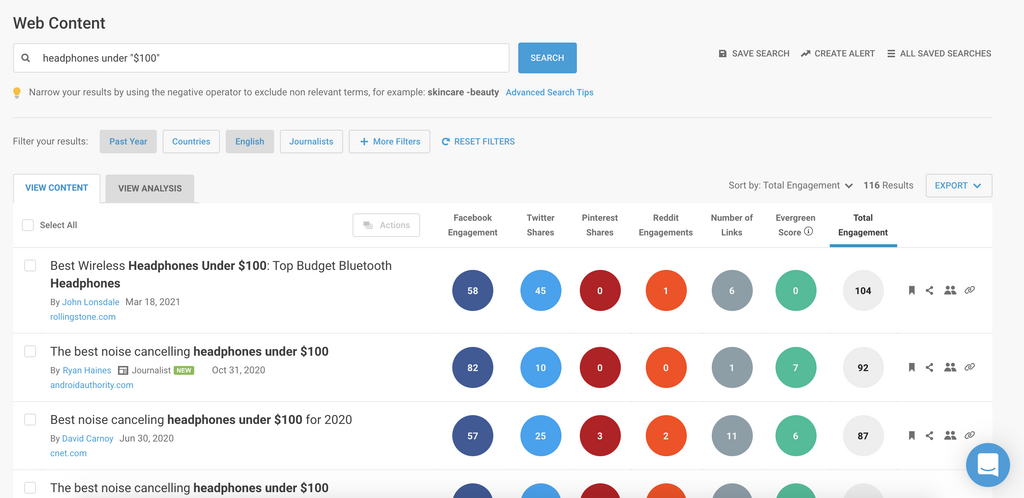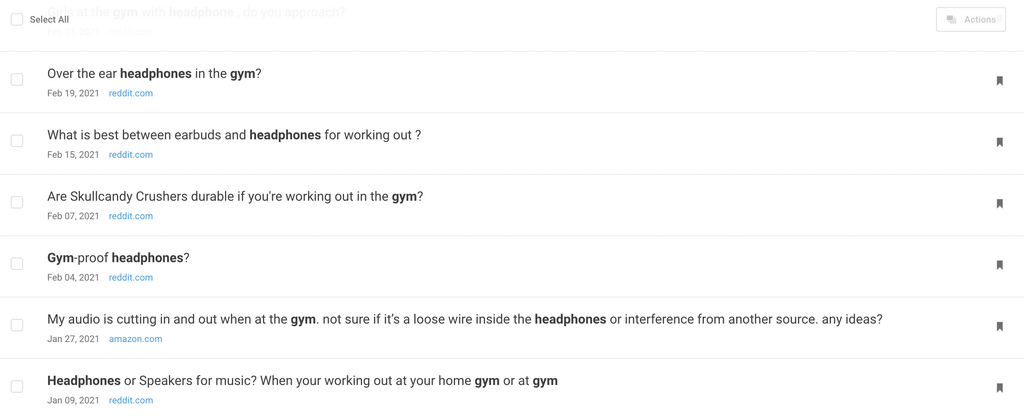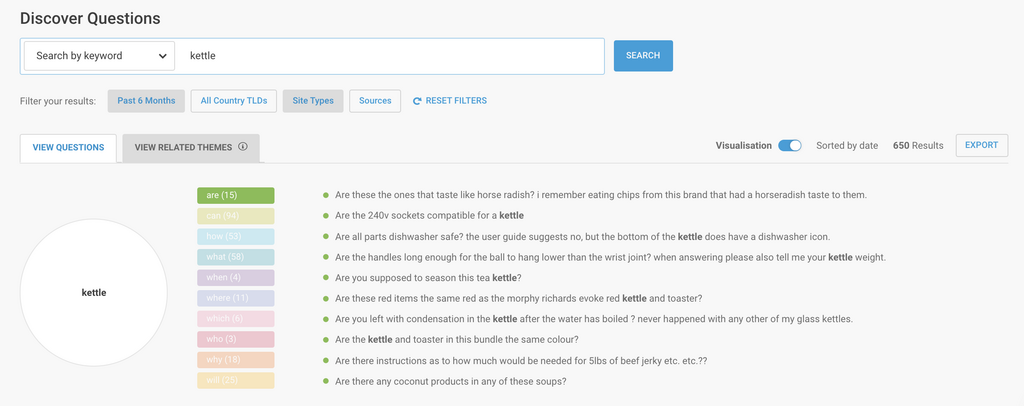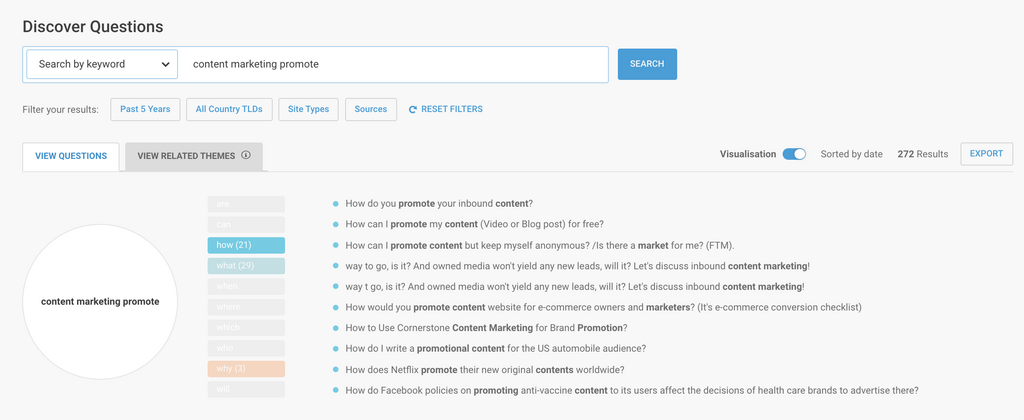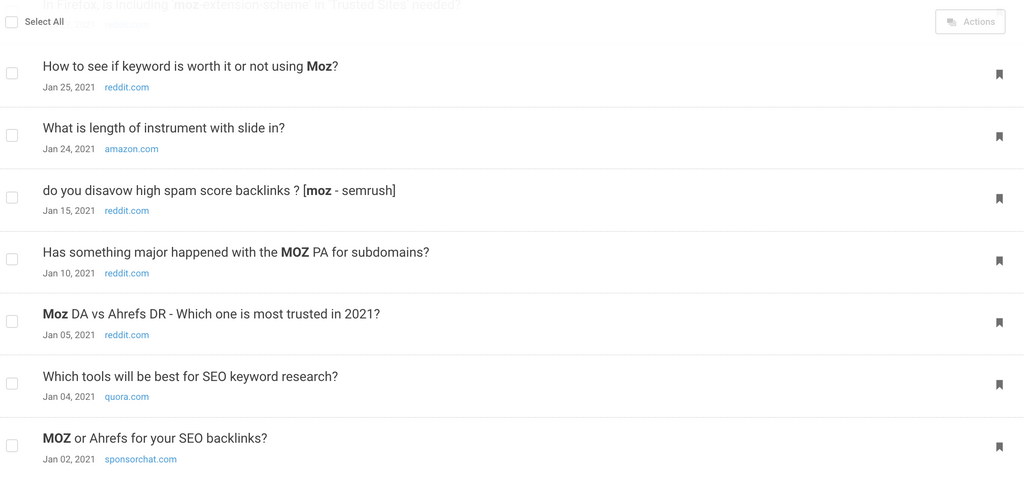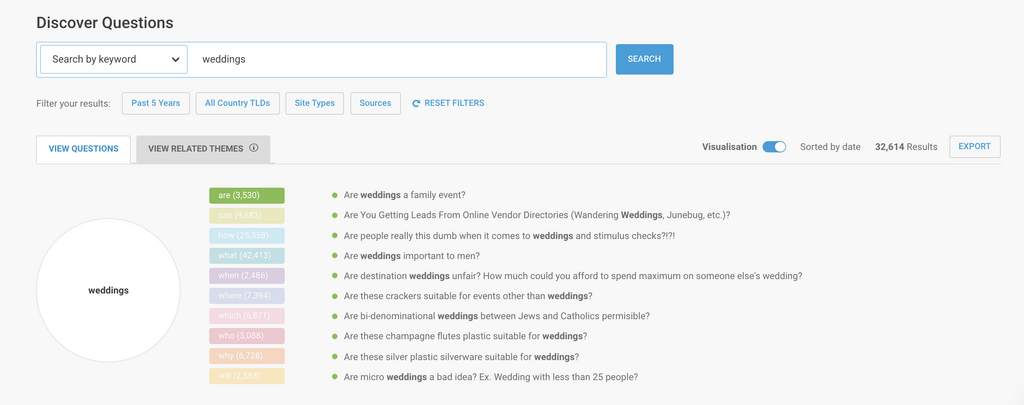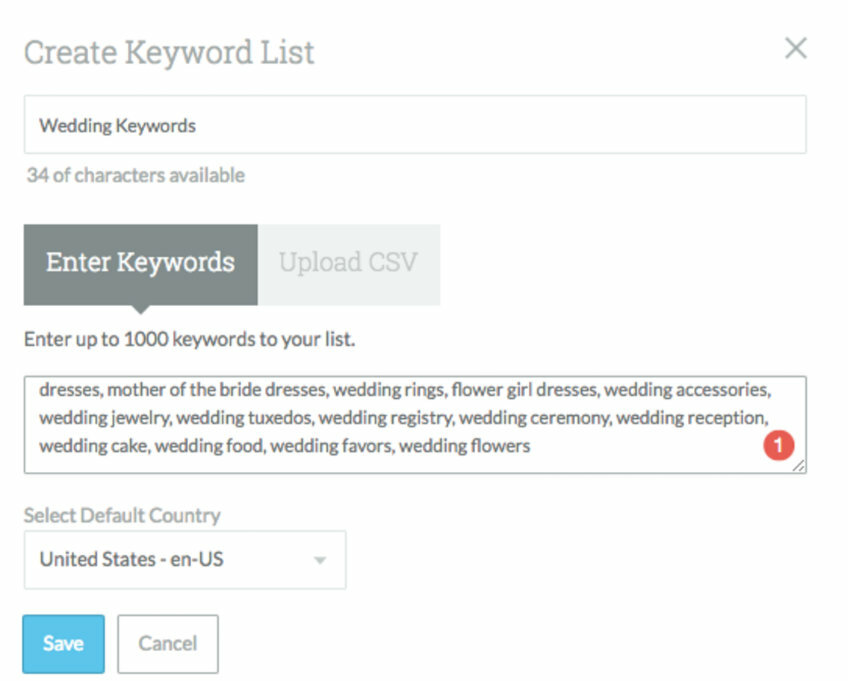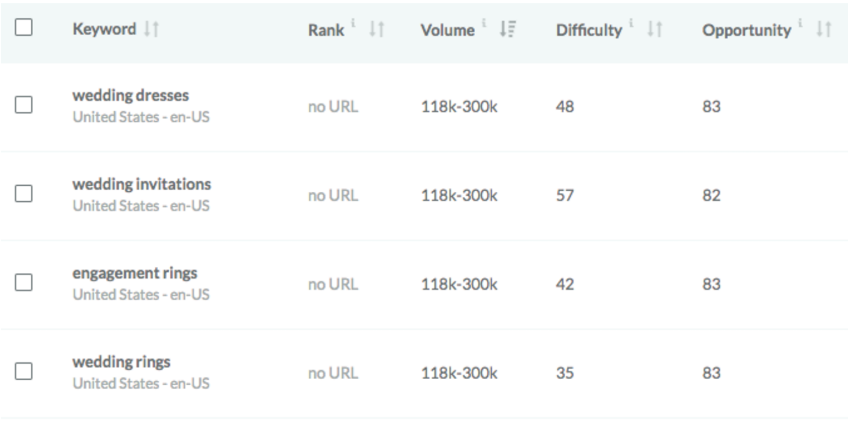Updated November 13th 2023
6 Tips On How To Use Customer Question Research To Improve Content
At BuzzSumo we have always been of the view that the best content answers customer questions. This is why our starting point for any content research is to understand the questions customers are asking. BuzzSumo’s new Question Analyzer is a fast and efficient way to search all the questions being asked about any topic across hundreds of thousands of forums and sites.
In this post we set out how you can use questions to:
- Improve your content marketing
- Improve your ecommerce site
- Undertake product research
- Build your authority as an expert
- Track and manage questions about your brand
- Undertake keyword research
BuzzSumo’s Question Analyzer
The Question Analyzer crawls hundreds of thousands of forums, as well as sites such as Quora, Reddit and Amazon. We parse out and group all the questions being asked on any topic or product from across all these sites and provide you with a link to the actual discussion and answers.
You can search by keyword across all sites or search any specific forum (eg healthboards.com) or any subreddit. You can also filter by date, type of site, such as only ecommerce sites, or search a specific domain such as all questions asked about a product on amazon.com.
Let’s have a look at how you can use this question data to improve your content.
1. How To Improve Your Content Marketing With Questions
The ultimate aim for any content marketer is to provide the best answer to the questions your customers or readers are asking. This means:
- Understanding the questions being asked and the concerns behind them
- Identifying topics where you can be the best answer
- Researching previous answers across forums and articles
BuzzSumo’s new Question Analyzer is designed to support these tasks and to improve your answer content. Let’s look at how you can use the Question Analyzer to create a better answer post.
What should you write about? Generating post ideas with questions
The best content resonates because it answers questions people are asking. You can research the questions your customers are asking by talking to your support and sales staff. However, this is a limited sample. The Question Analyzer provides a quick way to look at all the questions people are asking across the web about a specific topic. For example, let’s do a quick search for headphones.
Here are the results of our headphone search. The question analyzer found over 300,000 questions about headphones and has helpfully grouped these into topics such as:
- Bluetooth and wireless headphones
- TV headphones
- Best headphones
- Iphone headphones
- Noise cancelling headphones
- Best headphones for in the gym
- Pros and cons of earbuds
- Which headphones are most comfortable for long periods
- Questions around brands such as Skullcandy, Bose and Beats
- How to compare headphones
- Best headphones for airplanes
- Price of headphones and best headphones in price ranges
This provides us immediately with an initial list of possible articles we could write to answer questions about headphones. For example, we might decide to do an article on the best headphones under $100.
The Question Analyzer also allows us to click through to see the answers that people have already provided to these questions. These answers provide more context and may help us in putting together a comprehensive answer post. For example, here are suggested answers on one forum about headphones under $100.
We can also use the Question Analyzer to review questions about specific products such as the M40X headphones, if we want to go into more detail.
Can our post be the best answer?
The key is not simply to answer questions but to provide the best answer. Can you improve on current answers by providing a more comprehensive answer or by providing an updated answer. You can search Google to see some of the best answer posts. You can also use BuzzSumo to search for the most shared and linked posts published in the last 6 months or so. Here are the results for headphones under $100.
We can instantly see that articles doing well are very specific eg best in-ear headphones under $100 or best wireless headphones under $100. Thus we may want to write a more specific answer post which focus on a particular niche.
We can also see that the buyers guide had 31 links from unique domains and that the most shares took place on LinkedIn. This data may help us in our promotion strategy for our post. For example, we can approach sites that linked to these articles. We can also see via BuzzSumo who shared the article on Twitter and promote our post to those people. More on this later.
Refining our question and answer
Based on the above research we might want to refine our answer post, let’s say to something like the “10 best gym headphones for under $100”. We can redo our question analyzer search for more specific questions now, say questions on ‘best gym headphones’ in the last year and get more focused results. We could decide to refine this further for example, the best 10 wireless headphones for the gym.
I can now get a very specific set of questions via the Question Analyzer in the last year and review the answers provided.
By reviewing the answers to these posts combined with Google and other searches we can now put together a well researched answer post on the best Gym headphones.
Promoting your answer post
This is a key stage in any strategy.
The first thing you can do is post your answer article to all the forums identified by the Question Analyzer. You can also widen your search as you can post your article to also answer more general questions, for example, questions about headphones below $100 or best headphones for the gym. Thus the Question Analyzer instantly gives you 100 plus places where you can legitimately post your article as it is providing value in answering the specific question being asked.
There are also many other forms of promotion for example, approach the people that shared or linked to similar posts. Use BuzzSumo’s view sharers and backlinks feature to identify these people and sites.
Promote paid ads to Twitter users that have shared content on headphones. For example, by using BuzzSumo’s influencer search we can identify 1,000 Twitter accounts that have shared articles on gym headphones in the last year
2. How To Use Questions To Improve Your Ecommerce Site
Understanding customer questions is important if you are designing product pages and related information for an ecommerce site. Let’s have a quick look at at how the Question Analyzer can help you.
For the purposes of this post we can assume we are an ecommerce site selling everyday kitchen items such as kettles for boiling water. Here are three steps we can take to inform our site and content.
Search questions asked about kettles on ecommerce sites
We can start with a search for kettles but restrict our search to questions asked on ecommerce sites. You get more buying and clarification questions on ecommerce sites, where people are closer to the point of purchasing a product. You also tend to get more product specific questions on ecommerce sites. We can also view questions asked on research forums and Q&A sites but these tend to be more general as we will see below.
Our search for ‘kettle’ returns 650 questions from ecommerce sites in the last six months, as we can see below.
We can further filter these results but for now let’s have a look at the questions.
Reviewing Common Questions and Topics
The Question Analyzer has grouped the questions for us, so we can scroll down to explore the types of questions that are being asked. These fall into a number of categories, for example:
- How long does it take to boil water
- What is the energy usage
- Are there plastic components
- What temperature does it heat water to
- Does it have a limescale filter
- What is the warranty period
- What is the volume, how many cups
- What is the minimum fill level
- How long is the cord, is it cordless
- What voltage does it work on
- How heavy is it
- How noisy is it
We can also look at questions on forums and question and answer sites. When we do this we get just 1,200 questions and a different type of question. For example, questions about kettles in hotel rooms and the best travel kettles.
Using The Question Data
This question data can be used in a number of ways.
- If writing a product description we can now make sure to cover the core questions asked by buyers such as how long it takes to boil water, energy consumption etc.
- We can also write a related content article, for example, 10 questions to ask or consider when buying a kettle. Our post can aim to be the best post on the specific topic by combining our question research with research on the top posts on the topic from Google or BuzzSumo.
- We can also consider writing some more niche such as issues with kettles in hotels and the best travel kettles.
Finally, the great thing about the Question Analyzer is that it provides you with a list of places to promote your post. You can add value to many of the questions by providing a summary of your post as an answer and a link to your full post.
3. How To Use Questions For Product Research
Let us say we are a journalist writing about electric cars or a product researcher.
We can use the Question Analyzer to look at all questions asked about electric cars on all sources including forums, Q&A sites, Reddit and ecommerce sites.
These questions might help us understand the type of concerns or common questions that people have about electric cars.
A search returns around 11,000 questions and groups these questions for us. From a quick scroll down these questions we can see that common customer concerns include:
- Battery life
- The future of electric cars
- Hybrid cars
- Environmental impact of electric cars
- Number of charging stations
- How long it takes to recharge
There are also many questions around the best electric cars and specifically comparisons of different models.
These questions, and the associated discussions and answers, allow us to explore the topic in depth. As a journalist they may help us to create content around each concern or possibly a post on common concerns. As a product researcher it may be helpful to use this feedback to create more in-depth qualitative surveys based on the questions asked or to address the concerns in discussions with the product team.
4. How To Use Questions To Build Your Authority As An Expert
In a world of influencer marketing and content marketing it is very helpful to build a reputation as an expert in your specific areas. This reputation will ensure that your content and your views gain more authority and reach.
One way to build your reputation is to answer questions that people ask on a range of sites such as Quora, Inbound, Reddit or other forums. By answering questions you can build your authority and many of these sites will recognise your expertise by awarding you expert points. A key marketing strategy for many companies and individuals is to provide helpful answers to questions to grow their authority, reputation and traffic.
Many of these sites gain significant traffic. Reddit gets over 1 billion visits a month and Quora has over 100m visitors a month. There are many thousands of forums from niche health forums to hobby forums.
You can focus on one specific site such as Quora but the Question Analyzer will find questions on any topic across thousands of forums, giving you the opportunity to build your reputation across multiple sites.
Let’s assume your expertise is content marketing. A search will return over 9,000 questions about content marketing. Thus we may want to narrow our focus to say the promotion of content. We can do a search for ‘content marketing promote’, which returns a more manageable 272 more specific questions.
We can further refine our searches by date as we probably want to start with recent questions.
In this way we can make sure we identify multiple opportunities to demonstrate our expertise through answering questions.
5. How To Track And Manage Questions About Your Brand
What questions were asked recently about your brand on Quora or Reddit or in a discussion forum? It can be time consuming tracking questions about your brand across thousands of forums.
The Question Analyzer makes this process simple with a single search. We will find all questions asked about your brand, a client’s brand or a competitor’s brand (or all three) across tens of thousands of forums in seconds. We also crawl new forums as you request.
A simple search for Moz returns over 1,400 questions asked about Moz and its products. Here are some examples:
Answering these questions provides an opportunity to manage your brand reputation and to ensure you get core messages and updates to those interested. Finding older questions can also be very useful when you have new features so you can update answers and make sure they are current.
6. Using BuzzSumo’s Question Analyzer For Keyword Research
Popular search terms that get used for thousands of searches each day are relatively rare. There is also a lot of competition for these search terms and buying ads for popular keywords can be expensive.
The good news is that over 70% of daily searches are what is called ‘long tail’ searches. According to Moz this long tail “contains hundreds of millions of unique searches that might be conducted a few times in any given day, but, when taken together, comprise the majority of the world’s search volume.”
They have also observed that “long tail keywords often convert better, because they catch people later in the buying/conversion cycle. A person searching for “shoes” is probably browsing, and not ready to buy. On the other hand, someone searching for “best price on Air Jordan size 12” practically has their wallet out!”
The Keyword Research Process
There are many good tools that will help you with keyword research such as Moz’s Keyword Explorer and Google’s Keyword Planner.
You can also review the categories of major websites and explore Google suggestions. For example, when you type in Weddings to Google it presents you with a range of suggestions.
Once you have a list of keywords you typically check out average monthly search volume and other data using tools such as Google Keyword Planner and Moz Keyword Explorer.
The Role of Questions in Keyword Research
Reviewing questions can provide new insights and perspectives including blog post ideas and keyword ideas. For example, when we search for ‘weddings’ using the Question Analyzer we find over 32,614 questions asked about weddings.
These questions have been grouped into categories such as questions about:
- Wedding dress
- Engagement rings
- Invitations
- Bridesmaids
- Wedding proposals
- Wedding receptions
- Wedding gifts
- Bridal showers
- Wedding Rings
- Wedding ceremony
- Honeymoon and destinations
- Wedding planner
- Wedding cakes
- Wedding dance
The question analyzer provides a huge wealth of data that you can explore and use to generate further keyword ideas.
We can further explore specific groups of questions around say planning a wedding. This returns 10,000 further questions grouped into sub-topics that include:
- How to plan a wedding
- Lead in times for weddings
- How to plan a destination wedding including outdoor and beach weddings
- Wedding planners
- Wedding budgets
- How to manage the stress of organising a wedding
Each sub-group contains the actual questions asked and links allowing you to explore interesting discussions and see the answers that have been previously posted.
Next Steps in Keyword Research
Once you have your core keyword list you can use tools such as Moz’s Keyword Explorer to understand the search volumes, potential difficulty and the potential opportunity of your keywords.
Summary
Understanding customer questions is key to your content research. Hopefully this post has generated some ideas on you can practically use questions to improve your content marketing.
Try out the Question Analyzer!
We would love to get your views and ideas on other ways to use questions.
Categories
BuzzSumo ToolsCategories
BuzzSumo ToolsThe Monthly Buzz⚡
Subscribe to BuzzSumo's monthly newsletter to:
Stay up-to-date with the best of the best in content marketing 📝
Get data-informed content, tips and tidbits insights first 👩🏻💻
Read top shared content by top marketing geeks 🤓
Try
Enter any topic, term or url to search to see BuzzSumo in action. It’s free!
100% free. No credit card required.
